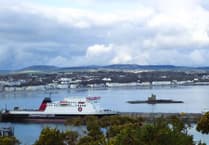Back in 2016, the Isle of Man was designated a UNESCO Biosphere Reserve, becoming the first and only entire nation to hold this status under UNESCO’s Man and the Biosphere Programme. In the first of a new monthly column called ‘Voices of our Biosphere’, the island’s Biosphere Project Assistant Breeshey Kermode discusses what it means to live in a Biosphere nation...
The Isle of Man is undoubtedly special. An island oozing charm, character, and culture; steeped in a magic that cannot be seen, only felt.
For these reasons, and many more, our island holds a unique honour: it is the only whole nation in the world to be designated a UNESCO Biosphere Reserve.
Since 2016, this prestigious status reflects not only the island’s extraordinary natural environment, but its vibrant culture, rich heritage, and strong sense of community.
It is these interconnected and treasured aspects of island life that have encouraged us, as a nation, to commit to Biosphere values.
First, we will look at what it really means, and doesn’t mean, to live in a Biosphere Reserve.
It is simple, yet powerful: we are all Biosphere.
A Biosphere is not a nature reserve. It’s a living, breathing model of how people and the rest of nature can thrive together.
It’s an understanding that the individual and collective choices we make – how we travel, what we buy, build, eat, or celebrate – all shape the future of the place we live. Every person and action contributes to it.
Being a Biosphere means developing in a considered and sustainable way - where progress is towards long-term benefits for both people and the rest of nature alike.
Each of the more than 750 Biospheres across the world is unique, but we all share three global functions:
· Conservation of both biodiversity and culture
· Sustainable development – both economic and social
· Research and education to inform conservation and development.
So, being a Biosphere is not only caring for our island’s environment, but also our living language and culture, and the development of a sustainable and resilient economy.
As the island approaches its first ten-year Periodic Review in 2026, attention is turning to the collective impact of our actions over the last decade: our achievements and challenges - and our ambitions for the next decade and beyond – where must we do better, and who do we want to be by 2036.
It is a chance for the island to demonstrate how community, culture, and care for the environment can and should go hand-in-hand and is an opportunity to make an exciting plan for future management.
Everything is connected. The environment we enjoy and rely upon, the heritage we preserve, the businesses we support, and the way in which we live our daily lives - each element plays a role in sustaining the island we love deeply.
Biosphere is not something separate. It is us, it is our home, and it is our future. We are Biosphere.
To find out more, you can visit the Biosphere website for more information at https://www.biosphere.im/
.jpeg?trim=0,0,0,0&width=752&height=501&crop=752:501)



-Andrew-Swithinbank-(Independent-Chair.jpeg?width=209&height=140&crop=209:145,smart&quality=75)